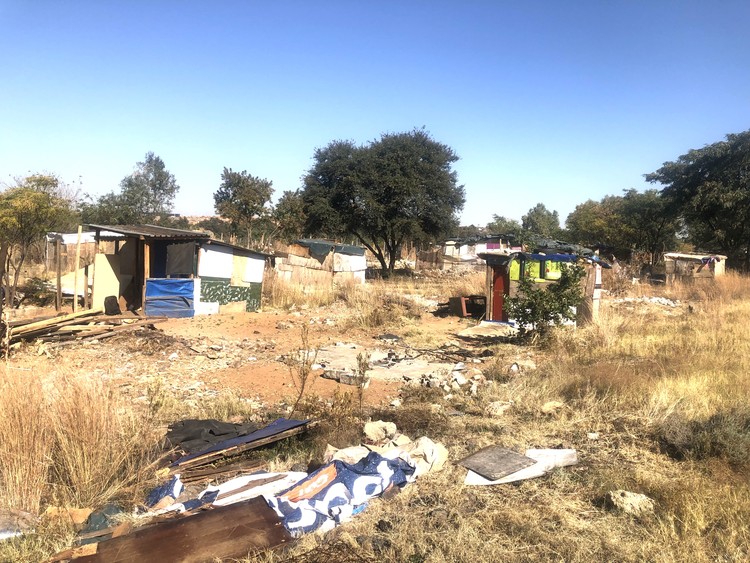
11 June 2024
Families in Lindokuhle Mnguni informal settlement in Johannesburg says they’re being harassed by the Johannesburg police and the Gauteng Crime Prevention Wardens. Photos: Kimberly Mutandiro
Families living in Lindokuhle Mnguni informal settlement in Johannesburg near an abandoned dump site say they are being harassed by members of the Gauteng Crime Prevention Wardens (popularly known as AmaPanyaza) and other officers.
The settlement, which is supported by housing movement Abahlali Basemjondolo, was started in 2013, and more people moved onto the land in February 2023. It is now home to about 90 households.
Residents say most of them moved there when they lost their jobs after the Covid lockdowns and could no longer afford to pay rent.
Over the past year, there have been at least four attempts to remove them from the land and demolish their shacks, but the families just rebuild their homes a day or two later.
The Johannesburg Metropolitan Police Department (JMPD) has previously defended the demolitions, saying only unoccupied shacks were destroyed. But the residents disagree.
The Social Economic Rights Institute of SA (SERI) has condemned these demolitions, which it says are unconstitutional because they were carried out without court orders. They say the wardens and JMPD officers have been to the settlement four times since February 2023. Residents say to date they have not seen a court order and none of the belongings confiscated during the demolitions have been returned.
SERI now plans to take the municipality and province to court over the matter.
Makhosazane Khuzwayo and her two young children live in a one-roomed shack made of board and plastic material. She says her home has been demolished three times in the last year by AmaPanyaza wardens and the JMPD.
“I have spent over R3,000 on building material to rebuild my shack three times. Each time we try to get comfortable, the police come to demolish our home. My children and I have no other place to go,” said Khuzwayo.
Another resident, Julie Nyateo, has lived in the settlement with her husband for two years. The couple survive by collecting and selling recyclables and occasional jobs in nearby suburbs. Each month they send the little money they make to their children, who live in Bushbuckridge, Mpumalanga.
Julie Nyateo has lived in the settlement with her husband for two years.
Nyateo says she fetches water from a broken pipe nearby and boils it for cooking. Her husband has built a pit toilet next to their shack, but they hope to have a proper toilet one day.
“Once this place has been approved for housing, we want our children to come and live with us,” she said.
According to Luyanda Sibulelo Fitshane, chairperson of the settlement and Abahlali member, the first few families to move in chose the land more than 10 years ago because it is owned by the City of Johannesburg and they hoped to get services.
Fitshane says people living in formal houses in nearby Rosherville blame the Lindokuhle Mnguni residents for lowering the value of their houses.
Most people in the settlement are unemployed and rely on piece jobs, according to SERI attorney Amanda Duma. “The settlement has no access to water, electricity and sanitation. The residents fetch water from a Rand Water pipe that passes through the settlement,” she said.
“There are minors and elderly people in the settlement. And if evicted, they would become homeless as they have nowhere to go,” she said.
Duma added that SERI would challenge the City of Johannesburg on the destruction of occupied shacks in terms of the Prevention of Illegal Eviction (PIE) Act.
She said raids on the settlement had been conducted without search warrants.
Ward 57 Councillor Faeeza Chame told GroundUp that the City of Johannesburg is currently applying for a court order to evict the residents. The land, which is jointly owned by the City of Johannesburg and City of Ekurhuleni, is earmarked for development.
“Residents have complained of the presence of an informal settlement in the vicinity, and the fact that there are illegal activities taking place there, including mining.
“As a result, we have complained to the Premier’s office, which led to some demolitions. The problem is that some shacks are empty, and no one lives in them.”
Justice Sithole moved to the area from Mozambique in 2013. He collects and sells recycling materials. He says his shack has been demolished five times.